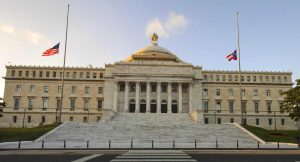By Sean Franklin

On Jul. 4, 1776, an upstart group of democratically-minded rebels mailed a strongly worded letter to King George III. It listed quite a few grievances, but chief among them was this one – Taxation without Representation. Americans paid money to the crown, but did not have any representatives in British Parliament. They had no say in the laws that were imposed upon them, and this was unacceptable. I’m sure you’re familiar with what happened next.
Fast-forward to 2017, and the situation has flipped. There are over three million American citizens living within our borders who pay federal taxes yet have no representation in the legislature: the citizens of Puerto Rico. Despite having a larger population than 21 of the U.S. states and paying over $3 billion a year in federal taxes, the island’s residents have no representation in Congress or the Senate. Thus, they have no voice in the creation of the laws that will nevertheless affect them. Nowhere is this effect more obvious than in the Jones Act.
The Jones Act (officially the Merchant Marine Act of 1920) stipulates that any cargo moving between two U.S. ports must be carried on American-built and American-owned ships staffed by American citizens. It was named for Senator Wesley Jones, who wanted to secure ship-building jobs in his home state of Washington. It was passed as a protectionist trade measure, but has since acted mostly as a burden on American consumers. Residents of Alaska, Hawaii and Puerto Rico have been hit especially hard because they have no contiguous land-based routes to the continental U.S.
Shipping is easier and cheaper than land-based transportation. In Europe, for example, 40 percent of domestic trade is conducted via the water. Only 2 percent of American trade is waterborne, even though a significant portion of the population lives on the coasts. This makes things more expensive to buy and even makes traffic worse on coastal highways as companies are forced to move their goods over land instead of over water. The effects of the Jones Act are felt especially hard in places like Puerto Rico, which have no real options except for shipping. Nowhere was this more evident than in the aftermath of Hurricane Maria. Puerto Rico’s residents were in dire straits; they had lost power, their homes were destroyed and many did not even have access to clean water. Aid was needed, and fast. Yet the only ships that could bring vital supplies to the island were ones that were American-made and American-staffed. Only 93 such ships exist in the US today. Aid that the island desperately needed was denied to them on account of an arcane law enacted almost a century ago. President Trump eventually suspended the Jones Act, but only after a week of doing nothing.
The Jones Act has consistently made life more difficult for the citizens of Puerto Rico. It makes things more expensive to buy, because shipping things to the island is unnecessarily expensive. It makes business more difficult to conduct, as would-be entrepreneurs can’t get things on or off the island at a reasonable price. Worst of all, it exacerbates humanitarian crises like Hurricane Maria, when supplies can’t make it to the island. To top it all off, the law was imposed on the citizens of Puerto Rico against their will and without their say. Puerto Rico is hit harder by the Jones Act than any other place in the United States, and yet it has no power to change or remove it. This is unconscionable.
Clearly, the time has come to repeal the Jones Act. It protects a few shipbuilding companies to the detriment of every U.S. consumer. But the Jones Act is merely symbolic of a larger issue. Puerto Ricans have no say in the laws that are imposed upon them. In my mind, the time has come for Puerto Rico to become a state. Recent referendums have shown support for statehood, so the citizens of the island are on board. But more than that, it goes against our core American values to deny U.S. citizens a voice in the government. If all men are created equal, then why are three million of them languishing on the sidelines? We must give the citizens of Puerto Rico a say. Otherwise, we’re no better than the British were in the eighteenth century.
Sean Franklin, FCRH ’21, is an urban studies major from Alexandria, Virginia.




































































































































































































